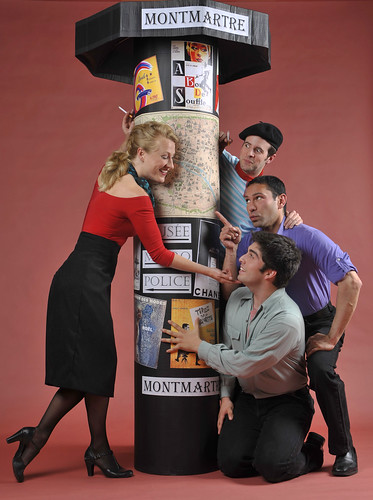
Alison Ewing (left) is the lone woman in 42nd Street Moon’s production of Irma La Douce, the story of a sweet Parisian prostitute. Playing some of the “mecs” in her life are (from top) Michael Barrett Austin, Rudy Guerrero and Victor-Alexander Tapia. Photo by David Allen
`Irma’ sells it, Moon sings it
««1/2
As the only woman in a show full of men, Alison Ewing is a bright light in every way.
She’s playing a hooker with a heart of gold (is there any other kind in musical theater?) in 42nd Street Moon’s production of Irma La Douce, a 1950s show that began life as a distinctly Parisian musical then slowly got blown out of proportion in its translations to the British and later the Broadway stage.
Ewing, making her 42nd Street Moon debut, sings and dances like a pro, looks great in Irma’s tight costumes and almost manages to make sense of the mostly nonsensical character. And that’s no small feat given the silly plot she has to deal with.
Irma walks the streets of Paris’ “Milieu” and happily turns tricks for her “mec” (pimp), played by a grunting Rudy Guerrero, and all is right with the world. She and her clients all socialize at the local bar and swill anisette after anisette.
Then a law student named Nestor (Kyle Payne, filling in for injured leading man Steve Rhyne, who will not be returning to the production) attempts to come between Irma and her mec’s fist. In a blazingly inane show of law book intellect, Nestor somehow wins Irma from the mec and the two embark on an awkward personal/business relationship.
Here’s where Irma gets positively Shakespearean. Sick of Irma selling herself to a long line of leering Parisians, Nestor disguises himself as rich old man (fedora, ratty bird, glasses) named Oscar and becomes Irma’s sole customer.
Now, we have come to like Irma quite a bit (especially as embodied by Ewing), but the fact that she can’t see through the stupid disguise or recognize her lover’s undisguised body is a little too absurd – even for musical theater.
Irma really goes off the rails in Act 2 when Nestor decides he’s had it with Oscar and disposes of the disguise and gets tried for murder in the process. He’s sent to Devil’s Island, somehow escapes on a raft (just where the raft comes from remains a mystery) and attempts to return to a pregnant Irma in Paris.
The show has been described as an “adult fairy tale” which is a way to gloss over prostitution and poor writing in one glossy tag line. But people rarely come to a musical for the plot.
The score, specifically the music by Marguerite Monnot, is delightful. For the 42nd Street Moon show, pianist and musical director Dave Dobrusky is ably assisted by busy reeds player Nick DiScala, who plays just about everything but an accordion.
The show’s two best numbers belong to Ewing’s Irma: “Dis-Donc, Dis-Donc” in Act 1 and “Irma-la-Douce” in Act 2. Rousing and sharply staged by choreographer Linda Posner, the numbers feel unquestionably French and have more life in them than the moribund book (the original French book and lyrics are by Alexandre Breffort, and the English book and lyrics are by Julian More, David Heneker and Monty Norman). The oft-reprised ballad “Our Language of Love” is lovely and worth hearing repeatedly.
Director Greg MacKellan’s effective pacing of the scenes gets somewhat hobbled by the blackout scene changes (to drag on and off the minimal set pieces designed by Tom Orr), but the general vivacity of the production and the appealing cast – headed by 42nd Street Moon veteran Bill Fahrner as narrator Bob-le-Hotu – keeps the evening lively.
FOR MORE INFORMATION
Irma La Douce continues through Oct. 12 at the Eureka Theatre, 215 Jackson St. San Francisco. Tickets are $24-42. Call 415-255-8207or visit www.42ndstmoon.org.

 A mere week before the first preview performances of the 1950s musical, leading man Steve Rhyne (pictured right with Bill Fahrner (center) and Alison Ewing (left), staring as Nestor Le Fripe, a law student who falls in love with the titular lovable streetwalker, injured his knee fairly severely and would not be able to perform – at least for previews and opening weekend.
A mere week before the first preview performances of the 1950s musical, leading man Steve Rhyne (pictured right with Bill Fahrner (center) and Alison Ewing (left), staring as Nestor Le Fripe, a law student who falls in love with the titular lovable streetwalker, injured his knee fairly severely and would not be able to perform – at least for previews and opening weekend.